For several months now, UNHCR, together with its partner organizations, have been helping the most vulnerable people in eastern Ukraine to protect them from the coronavirus and help them survive this difficult period. They have distributed disinfectants and personal protective equipment, supported mask-making initiatives. How has this affected people’s habits? Do they comply with quarantine recommendations? We asked the residents of Donbas about this.
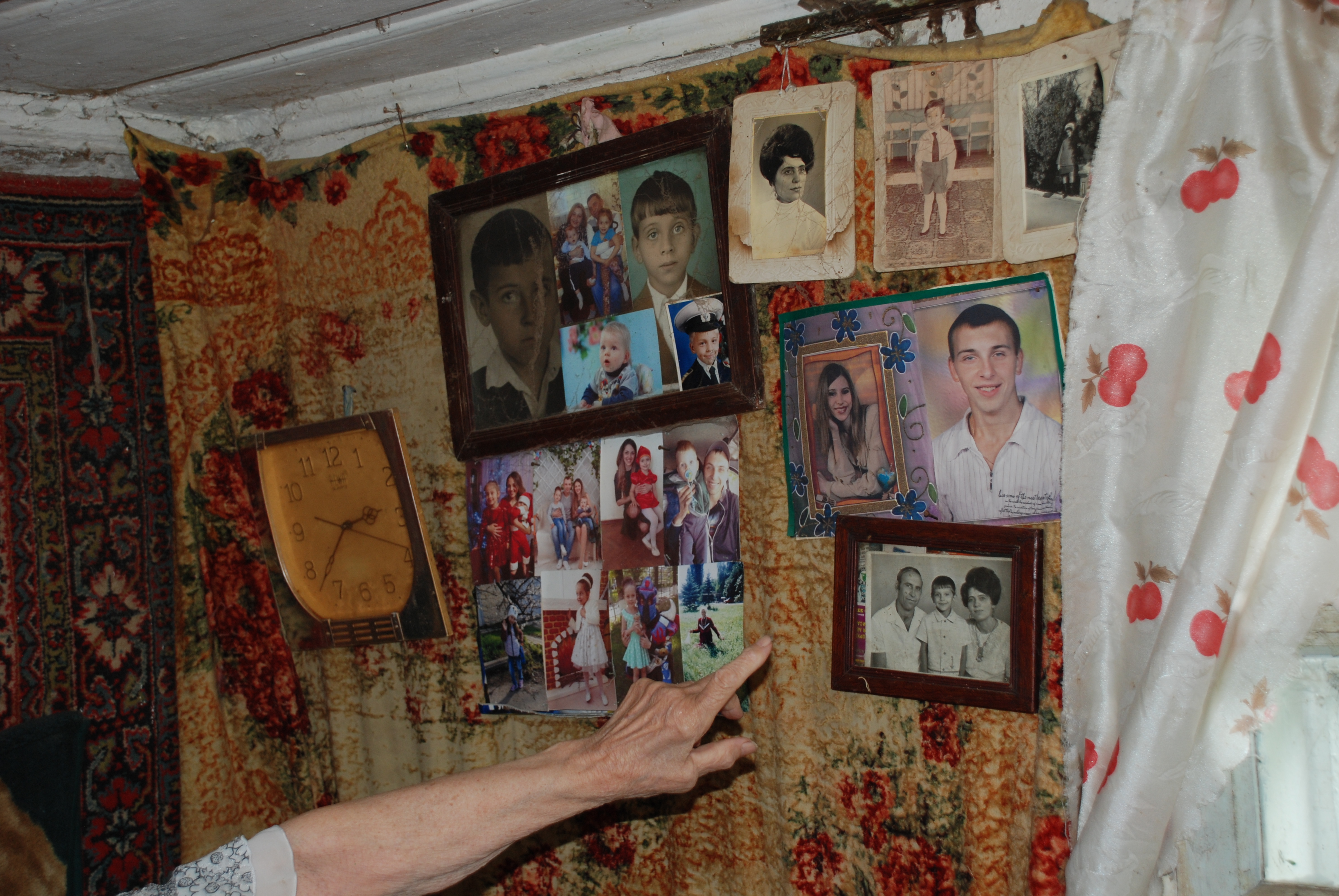
Anna Ivanovna, 83, the village of Nyzhniya Vilkhova, Stanychno-Luhanskyi region, Luhansk oblast:
“I live alone, I’m not leaving the house now. Here are two stools. When I cook, I sit down on one, and lean on another one. I move around the house also the same way. When I need to feed the chickens, I go out with walkers. If someone comes to me, then I put on a mask. I also wash my hands with soap”, says Anna Ivanovna. Anna Ivanovna was born in the village Nyzhniya Vilkhova, Stanychno-Luhanskyi region, Luhansk oblast.
For a long time, she worked and lived in Luhansk. After retiring, she returned to her parents’ house. Despite the fact that Anna Ivanovna constantly resides in the government controlled areas, she is still registered in Luhansk.

At the beginning of March 2020, Anna Ivanovna went to Luhansk to undergo treatment at the hospital, but was unable to return home due to the temporary suspension of the Entry-Exit Checkpoint Stanitsia Luhanska. This was to prevent the spread of the coronavirus infection. On May 19, Anna Ivanovna was able to cross the contact line and return to her permanent residence thanks to the organized so-called “green corridor” – a pass for people who have good reasons for crossing the contact line. Since Anna Ivanovna doesn’t have a smartphone to download the “Diy Vdoma” application for self-isolation, she was forced to agree to a 14-day observation at the hospital in Stanitsia Luhanska.
This elderly woman was surveyed under the program of assistance in the field of protection from UNHCR, which is designed for the most vulnerable people. With the money received, Anna Ivanovna acquired the necessary means of rehabilitation – a walker and a tonometer.
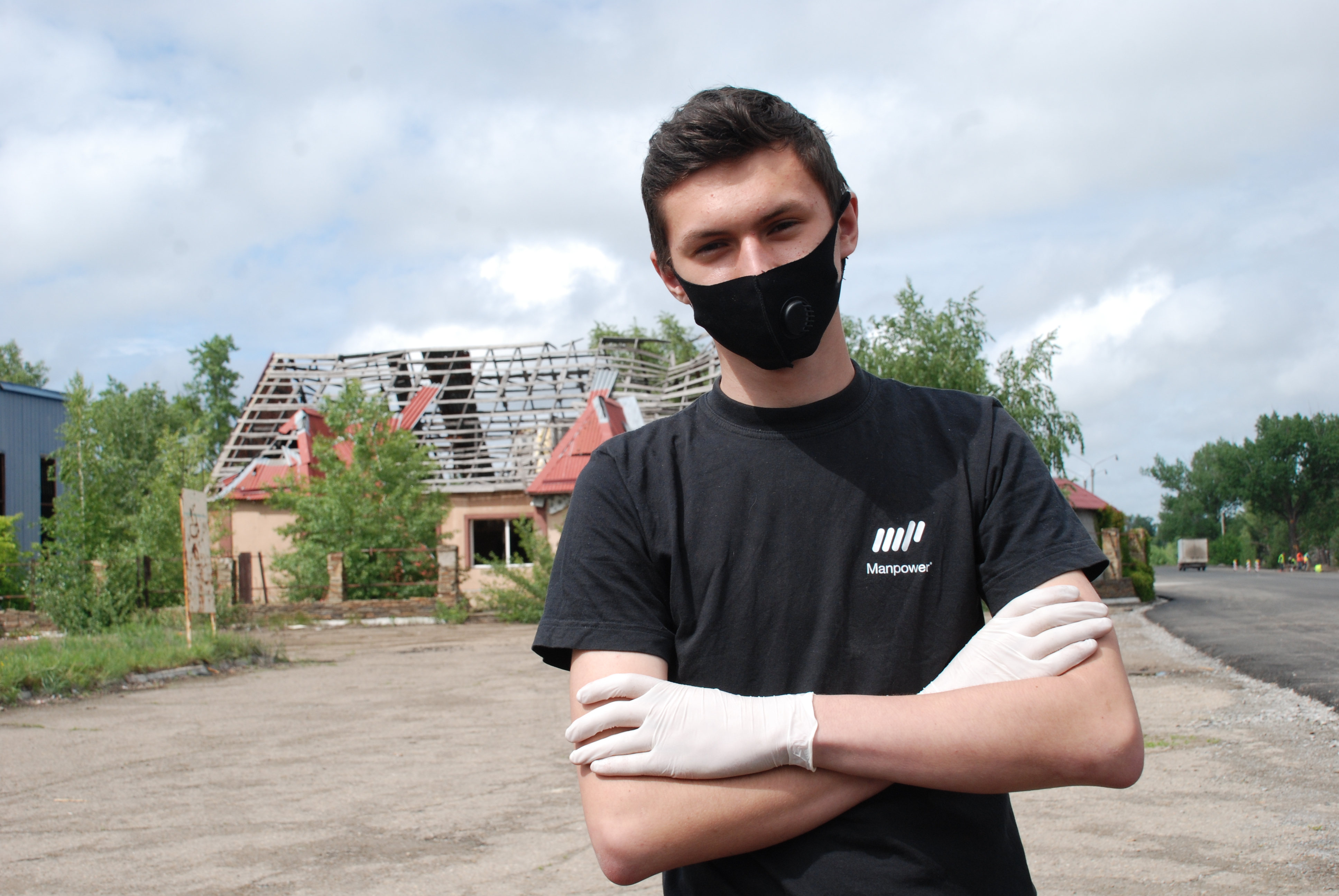
Ilya, 16, Valuiske village, Stanychno-Luhanskyi region, Luhansk oblast:
Ilya is one of the active members of the youth organization “We are a generation for change,” which, together with the humanitarian center “Proliska-Stanitsia Luhanska,” has implemented many projects aimed at supporting and protecting communities near the contact line. Among the projects are the opening of the summer cinema in Valuiske village with a free Wi-Fi zone, the tailoring and distribution of reusable bags, as well as the organization of various events for children and adults.
Ilya feels that wearing a mask is an obligatory part of his life. He doesn’t go anywhere without it. At first it was uncomfortable wearing it, but then he got used to it. People who don’t wear masks scare him, because this is about the safety of each of us. He chose a mask that is both fashionable and comfortable. He has two reusable black masks and one is green. He washes them regularly. He also has some ordinary disposable masks. In addition, he began to wash his hands more often with soap and use an antiseptic before entering the store, after shopping, in public places, and after using paper money.
“Recently, I began to use a credit card more often than paper money, because it can be disinfected. I also constantly clean my mobile phone”
Because of the coronavirus pandemic Ilya and his classmates were switched to distance learning at school. It was difficult because they were in the graduating class. Not all of the teachers could easily switch to this work format. The students were also asked to do a lot of independent work. On May 15, they began to prepare for an external independent evaluation through video conferencing. Using this format, they have been more actively communicating with their teachers online.
“We hang out less, adhere to the regime of self-isolation, go out only in case of an emergency, always wear masks, and take an antiseptic. How do we communicate? Mostly on the Internet. We create group chats and video calls. Overall, it’s fun,” said Ilya.
Inna, 30, and her son Joseph, 6, the city of Chasiv Yar, Donetsk oblast:
“During the quarantine I couldn’t get used to the mask, because due to a lack of oxygen I often faint. This is because of my health condition. If necessary, of course, my son and I are trying to wear masks, which were given to us by the employees of the humanitarian center Proliska-Chasiv Yar”, says Inna.
They don’t walk around the city unless they need to, and if they go out they keep distance between themselves and others. They also wash their hands more often than before, and they clean the products that they buy at the store as soon as they get home. They spend a lot of time with her son at home. To avoid boredom, they come up with games to play.
In 2016, Inna and Joseph left the city of Makiivka, which is located in the non-government controlled areas, to visit her sister in the village of Mironivka. The boy was only 2 years old at that time. Mironivka was regularly under the fire, so Inna was looking for a safer place to move. Thanks to the voluntary displacement project, which is being implemented by the Humanitarian mission Proliska with the financial support of UNHCR, the family acquired a house in the city of Chasiv Yar, Donetsk oblast. In addition, employees of the humanitarian center Proliska-Chasiv Yar took Inna and her son under social support.
After the move, Inna stopped receiving social benefits for internally displaced persons (IDPs), and also faced the problem of unemployment, as she did not have a secondary school certificate. Employees of the humanitarian center Proliska-Chasiv Yar helped her apply to a Bakhmut evening school, get her son in kindergarten, as well as apply for a subsidy and restore her social benefits. She also underwent a full medical examination and received a disability group.

Tetyana, 47, and Lyudmila, 27, the city of Chasiv Yar, Donetsk oblast:
Tetyana and Lyudmila are mother-in-law and daughter-in-law. Tetyana and her family left Popasna and moved to Chasiv Yar in 2014, when the armed conflict began. In 2015, the eldest son Vlad married Lyudmila. Now the couple is raising five children, two of them are foster children. Employees of the humanitarian center Proliska-Chasiv Yar have been providing social support, as well as supporting the family since 2014.
Tetyana said that during the lockdown they got used to the masks, although it’s still difficult to breathe in them. It’s hard to buy masks in pharmacies or stores, but they always have them, thanks to Proliska’s employees and volunteers. When they go out they try to keep their distance from other people. But to be honest, she said this is difficult because they are very sociable.
“With the beginning of the lockdown, we started a mandatory tradition in our house: immediately wash your hands when you enter the house”
produced and distributed to
persons with specific needs
and social workers since the
outbreak of COVID-19
distributed to Centers for Social
Services for Youth in Luhanska
oblast
received sanitizing items to
ensure improved hygiene
conditions for the inhabitants
provided with hygiene kits,
containing sanitizing and
cleaning products in western
and central Ukraine
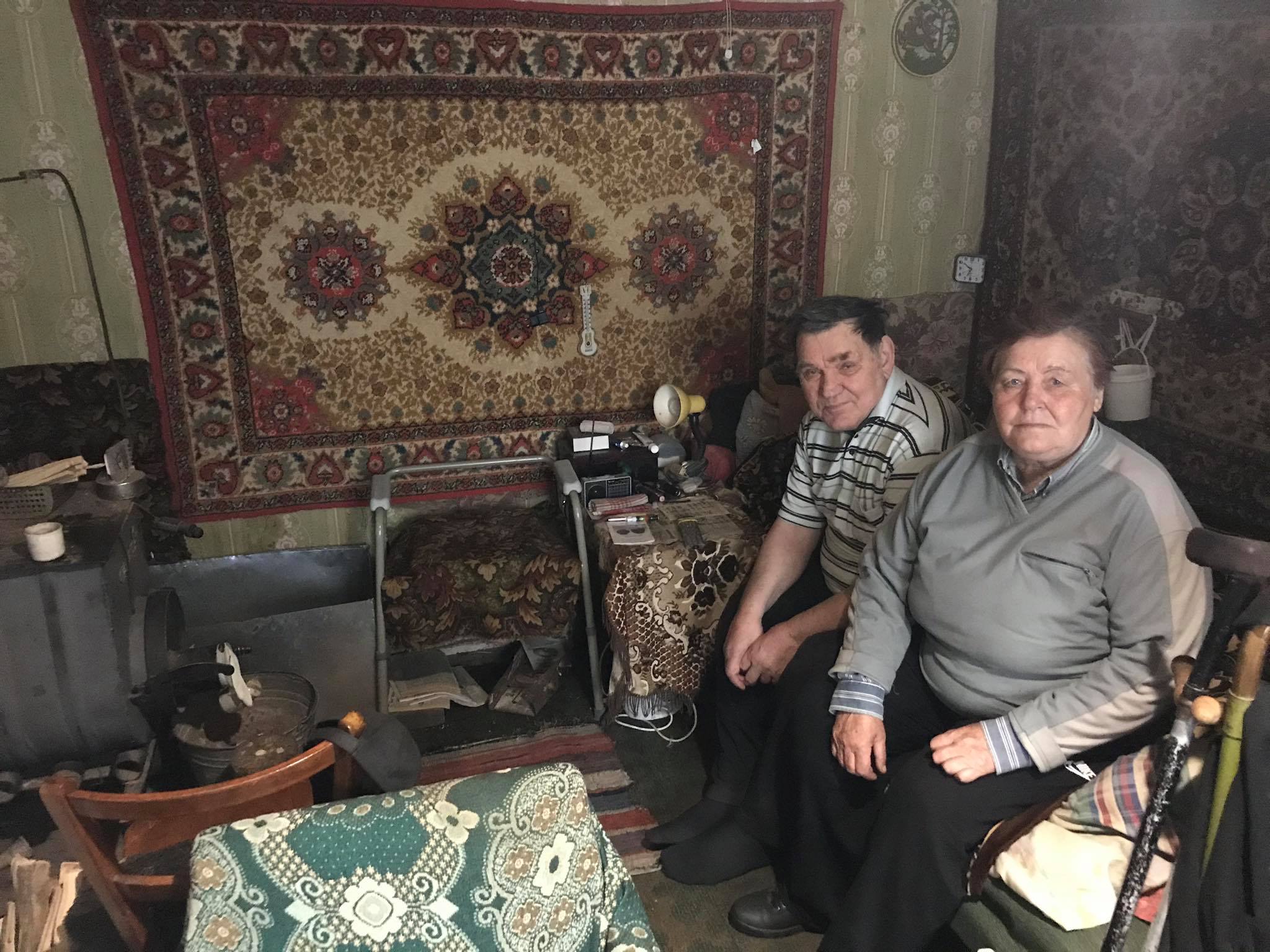
Galina Oleksiivna, 68, Peredilske village, Stanychno-Luhanskyi region, Luhansk oblast:
Galina Oleksiivna takes care of her husband who has a disability. Thanks to the support of the humanitarian mission Proliska and the assistance program in the field of protection from UNHCR, the spouses were able to purchase a solid fuel boiler.
“In general, I try not to go outside, and if I go out, I quickly return home, I must respect the social distancing. Well, the other day there was a funeral – the neighbor died. I didn’t even go to the cemetery, because I observe the lockdown”
They have begun to wash their hands more often, because they are very afraid of the coronavirus. The TV said it is very dangerous, so they are scared. They don’t wear masks at home, but they always wear them when they go out. They bought two masks at the beginning of the quarantine at the store for 15 UAH. They wash them everyday. When the activists in Peredilske began to sew masks, Proliska provided them with fabric. These masks were given to them at the first-aid post.
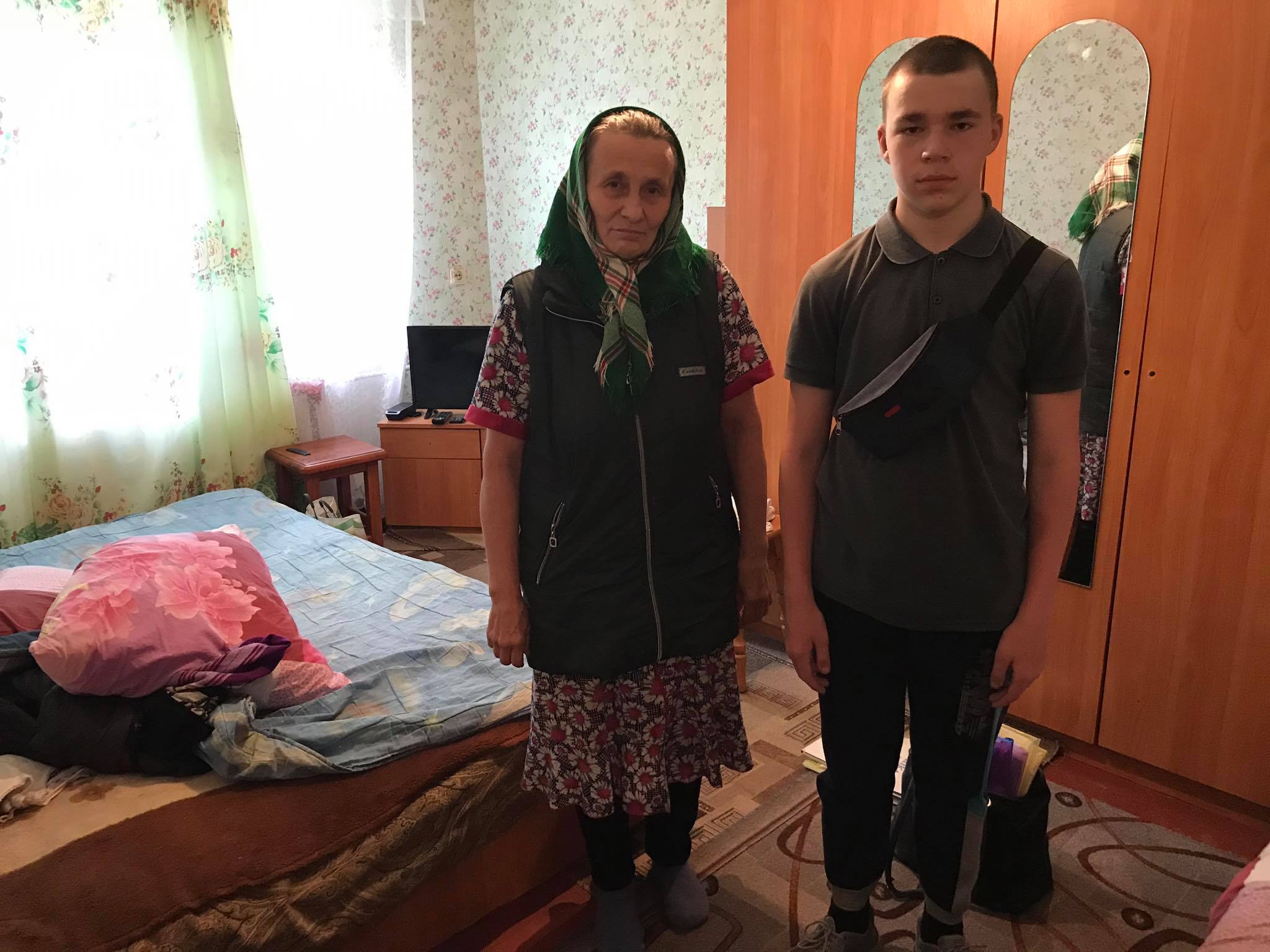
Olena Oleksandrivna, 60, and her grandson Roman, 13, the city of Shchatstia, Novoaidarskyi region, Luhansk oblast:
Olena Olexandrivna lives with her 13-year-old grandson. The humanitarian center Proliska-Shchatstia has been supporting this low-income family since 2018: if necessary, they transfer products and things from the “social wardrobe”. Thanks to the program of assistance in the field of protection from UNHCR, the grandmother and grandson were able to purchase two beds.
Olena says that their habits during the lockdown haven’t changed a lot. She used to clean her apartment regularly and wash her hands. She educates Roman so that he is clean and tidy. They wear masks regularly, every time they go out. At first they bought them for 7 UAH at the pharmacy, and then she sewed reusable masks for herself and her grandson. It’s very convenient, she washes them regularly. There are no problems with masks now, but at first they weren’t available.
“I am a very religious person, but when the quarantine began I didn’t even go to church, so as not to be among people. The priest allowed me to do that. Now I go to church, but we always gather in small groups, and we stand at a distance. I am very worried, especially for my grandson, so that he does not get infected anywhere. I really want this epidemic to end faster, so we will return to a normal life,” Olena says.

Nina, 64, and Marina, 58, Bakhmutka village, Donetsk oblast:
Nina and Marina have health problems and need constant medication. There is no pharmacy in the front-line village. Previously, women took a bus to buy medicines, but due to the lockdown, all public transport has been canceled.
“If one need to buy the necessary drugs, one has to either go to Bakhmut by taxi, or ask for help from the humanitarian center Proliska-Mayorsk, who has been working on the territory of the village for five years”
They try not to leave the house without a need, and if they leave, then they must wear masks and observe the distance. From time to time there is a problem with the products. They only have a small shop in which there is a very small variety of goods with high prices. If they need something, they ask volunteers or youth to go and buy it in Bakhmut. In Bakhmutka, washing hands more often is problematic, as there are constant problems with water in the village, they said. So that local residents could observe the rules of hygiene, employees of the humanitarian center Proliska-Mayorsk turned to the organization “People in Need” and asked to increase the amount of water delivered to Bakhmutka.
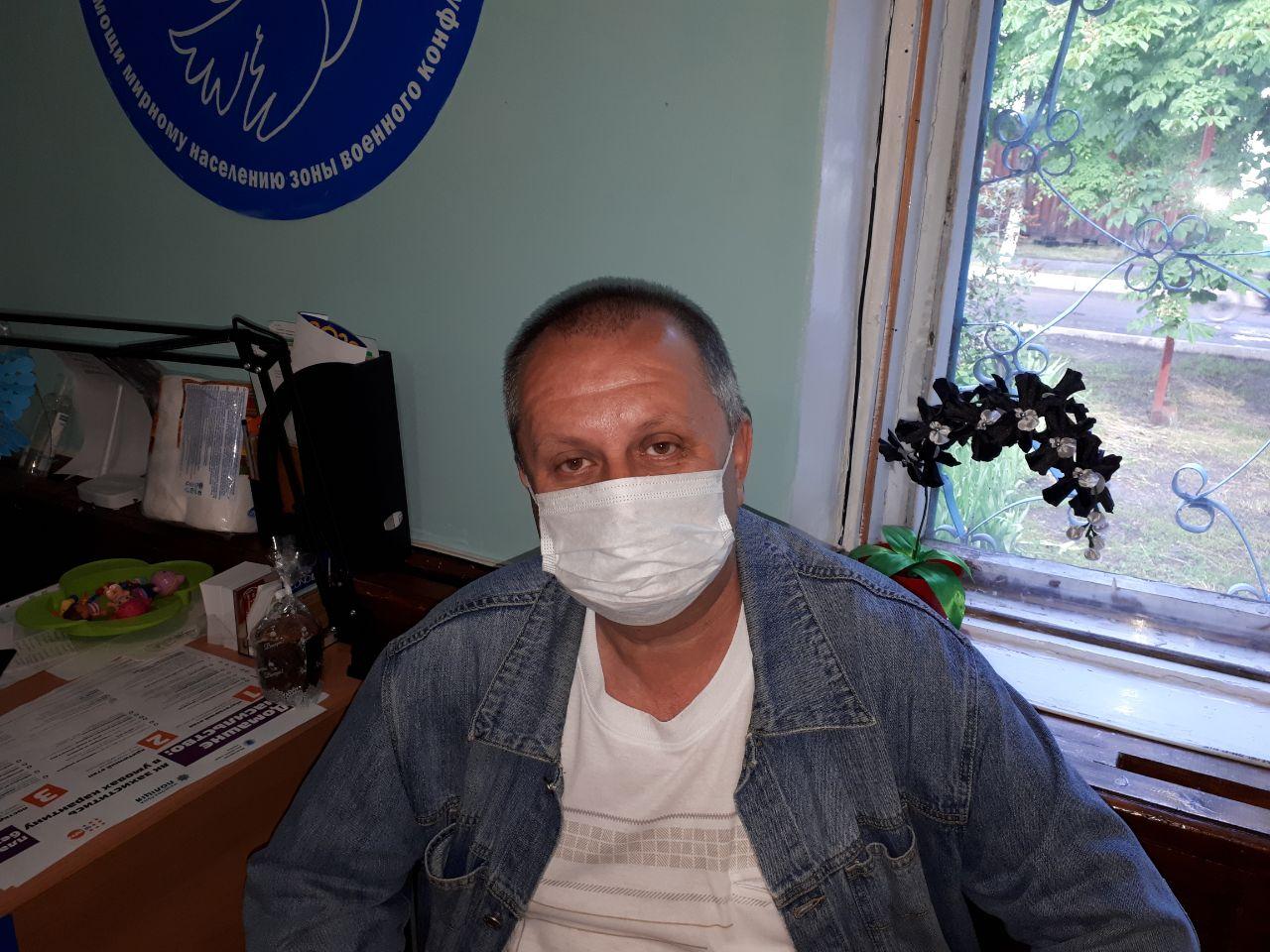
Sergiy, 54, city of Svitlodarsk, Donetsk oblast:
“Currently I do not work because I am trying to arrange the disability group and start receiving social benefits. At the beginning of quarantine I was very worried, avoided crowded places, tried to saty more at home”, says Serhiy.
He got masks from his friends, because he could not buy them by himself. At first, the prices in pharmacies were very high or masks were out of stock. Nobody gave him a mask in hospital as well. With the beginning of the COVID-19 pandemic, he became more responsible to his health. He keeps social distance and wears a mask. During the quarantine, with the support of the staff of the Humanitarian Center Proliska-Svitlodarsk, who provided social support, Serhiy passed a medical and social expert commission at the Sloviansk Medical and Social Expertise Center to receive a disability group. Then Serhiy applied to the Department of Labor and Social Protection of the Bakhmut district for social benefits and assistance as a low-income person.
Thanks to UNHCR’s protection program, the man was able to pay for transportation to travel from Svitlodarsk to Bakhmut, as well as buy a blood pressure monitor. This not only helped to monitor the health condition, but also reduced visits to the family doctor, and thus reduced the number of contacts with other people during the quarantine period.
This article was edited thanks to the support of an online volunteer Jennifer Miller. Find volunteering opportunities at https://www.onlinevolunteering.org/en
UNHCR jointly with its NGO partners re-programmed its community support and project activities to prepare and respond to specific needs caused by the COVID-19 pandemic. So far, UNHCR initiated 47 projects related to COVID-19, on both sides of the ‘contact line’ in eastern Ukraine, designed to prepare and respond to the threat of COVID-19. The projects include community support to produce and distribute face masks, quick impact projects in the form of the provision of personal protective equipment, bicycles and other equipment to local health care providers in order to increase their capacity to respond to COVID-19.
The UNHCR has disseminated over 50,000 posters and brochures about COVID-19 prevention in isolated villages near the contact line, resources that have been produced by the World Health Organization.
Share on Facebook Share on Twitter